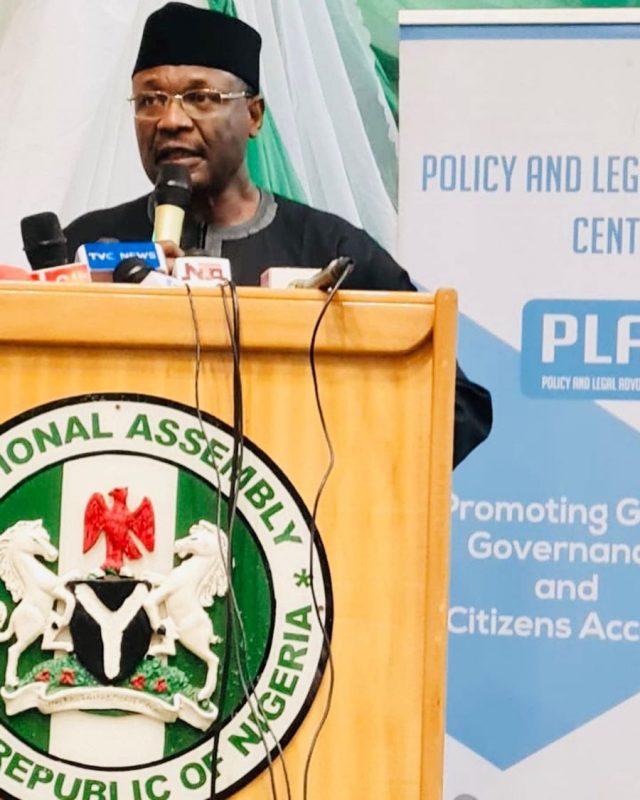WED, 24 AUG, 2022-theGBJournal| The Independent National Electoral Commission (INEC) Chairman, Prof. Mahmood Yakubu, Tuesday made a strong case for the establishment of the National Electoral Offences Commission at the public hearing on the National Electoral Offences Commission Bill, organised by the House of Representatives Committee on Electoral Matters in Abuja.
The INEC Chairman argued that the Bill for an Act to establish the National Electoral Offences Commission is a critical legislation.
‘’It has been part of all national conversations on constitutional and electoral reforms for the last 13 years. The Justice Mohammed Uwais Committee on electoral reforms recommended it in 2009, echoed by the Sheikh Ahmed Lemu Committee following the post-election violence of 2011 and, most recently, by the Senator Ken Nnamani Committee on Constitutional and Electoral Reform in 2017,’’ he said in his presentation to House of Representative Committee.
According to him, similar recommendations are contained in reports of police investigations, INEC administrative enquiries, court judgments, reports by the National Human Rights Commissionas well as several accredited election observers.
The hearing comes about four months after a similar public hearing on the same Bill by the Senate Committee on INEC held on 28th April 2022, and according to Prof. Mahmood Yakubu, ‘’this is the closest the nation has come to the passage of the long overdue National Electoral Offences Commission Bill into law. I hope in the next few months, the National Assembly will pass the Bill so that it will not suffer the fate of previous efforts which were inchoate at the end of the lifespan of the Assembly.’’
Prof. Mahmood Yakubu in his remarks outlined the Commission’s challenges and huge responsibilities and suggested that the solution does not lie in expanding the federal bureaucracy by creating a new Commission.
‘’We believe that the National Electoral Offences Commission should be seen as an exception,’’ he said.
According to the INEC boss: ‘’It is clear that the reform of our electoral process cannot be complete without effective sanctions on violators of our laws. At present, INEC is saddled with the responsibility of prosecuting electoral offenders under the Electoral Act. This has been very challenging for the Commission. For instance, since the 2015 General Election, 125 cases of electoral offences were filed in various Courts out of which 60 convictions have been secured so far, including the most recent one in Akwa Ibom State.
The Commission would like to see more successful prosecution of offenders, not just ballot box snatchers, falsifiers of election results and vote buyers at polling units but most importantly, their sponsors. We look forward to the day when highly placed sponsors of thuggery, including high-profile figures that seek to benefit from these violations, are arrested and prosecuted. We believe the work of the proposed Commission will help in this regard.
However, much as the Commission would like to see more successful prosecution of offenders, our effort is hampered by obvious constraints. INEC is basically an electoral commission with extensive responsibilities which include the registration and regulation of political parties, the monitoring of party and campaign finance, their primaries, congresses, meetings and conventions; nationwide Continuous Voter registration (CVR) and the maintenance of the national register of voters; creation of polling units; delimitation of electoral constituencies; voter education and publicity; management of electoral logistics; recruitment, training and deployment of election duty officials.
Other responsibilities include the conduct of numerous off-cycle and bye-elections; new innovations to promote inclusivity and electoral integrity; election security in consultation with the security agencies; strategic engagement with stakeholders; formulation of regulations, guidelines and manuals for the conduct of elections and electoral activities to give clarity to the provisions of the Constitution and Electoral Act; and maintenance of extensive physical assets (offices, residential accommodation and other facilities) nationwide. In many jurisdictions, some of these responsibilities are carried out by distinct and autonomous agencies.
In addition to these responsibilities, the Commission is required to prosecute electoral offenders. However, the Commission’s incapacity to arrest offenders or conduct investigation that leads to successful prosecution of especially the high-profile offenders, led to the suggestion to unbundle the Commission and assign some of its extensive responsibilities to other agencies as recommended by the Uwais and Nnamani Committees.
For those who argue that the solution does not lie in expanding the federal bureaucracy by creating a new Commission, we believe that the National Electoral Offences Commission should be seen as an exception. While there are other security agencies that deal with economic and financial crimes, I am yet to hear anyone who, in good conscience, thinks that it is unnecessary to have established the anti-corruption agencies.
We have studied the 46 Clauses of the Bill under consideration and made 16 comments. I would like to touch on two Clauses and make a general observation while submitting our detailed comments to the Committee. First is Clause 33 (1) of the Bill which confers jurisdiction on Federal, State and FCT High Courts to try offenders under the Bill. However, these Courts are already over-burdened. It is proposed that Electoral Offences Tribunal be established with exclusive jurisdiction to try electoral offenders. The second is Clause 44 which empowers the Attorney-General of the Federation to make rules or regulations for the Commission. Conferring additional power to any other body may cause friction or conflict with the Commission which should be independent in the discharge of its functions even if doing so requires consequential amendment to other laws of the Federation to empower the Commission and guarantee its independence.
In any case, Clause 1(2)[c] of the Bill grants the Commission power to make its own rules and regulations. Thirdly, because work on the Bill started before the passage of the current Electoral Act into law, all references to the Electoral Act 2010 (as amended), for example Clause 39(1), should be replaced with relevant provisions of Electoral Act 2022.’’
Twitter-@theGBJournal| Facebook-The Government and Business Journal|email: gbj@govbusinessjournal.ng|govandbusinessj@gmail.com










